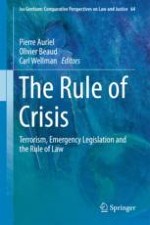2018 | OriginalPaper | Buchkapitel
Emergency as a State of Mind—The Case of Israel
verfasst von : Suzie Navot
Erschienen in: The Rule of Crisis
Aktivieren Sie unsere intelligente Suche, um passende Fachinhalte oder Patente zu finden.
Wählen Sie Textabschnitte aus um mit Künstlicher Intelligenz passenden Patente zu finden. powered by
Markieren Sie Textabschnitte, um KI-gestützt weitere passende Inhalte zu finden. powered by
